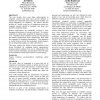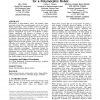5 search results - page 1 / 1 » When e-th Roots Become Easier Than Factoring |
ASIACRYPT
2007
Springer
13 years 11 months ago
2007
Springer
We show that computing e-th roots modulo n is easier than factoring n with currently known methods, given subexponential access to an oracle outputting the roots of numbers of the ...
SIGOPSE
1998
ACM
13 years 9 months ago
1998
ACM
with this, the thread abstraction was introduced. While threads are handling events, or awaiting specific events, unrelated events can be handled by other threads. Unfortunately, ...
CHI
1999
ACM
13 years 9 months ago
1999
ACM
The past decades have seen huge improvements in computer systems but these have proved difficult to translate into comparable improvements in the usability and social integration)...
IPPS
2005
IEEE
13 years 10 months ago
2005
IEEE
The problem of writing high performance parallel applications becomes even more challenging when irregular, sparse or adaptive methods are employed. In this paper we introduce com...
HRI
2006
ACM
13 years 10 months ago
2006
ACM
Polymorphic, or shape-shifting, robots can normally tackle more types of tasks than non-polymorphic robots due to their flexible morphology. Their versatility adds to the challeng...


